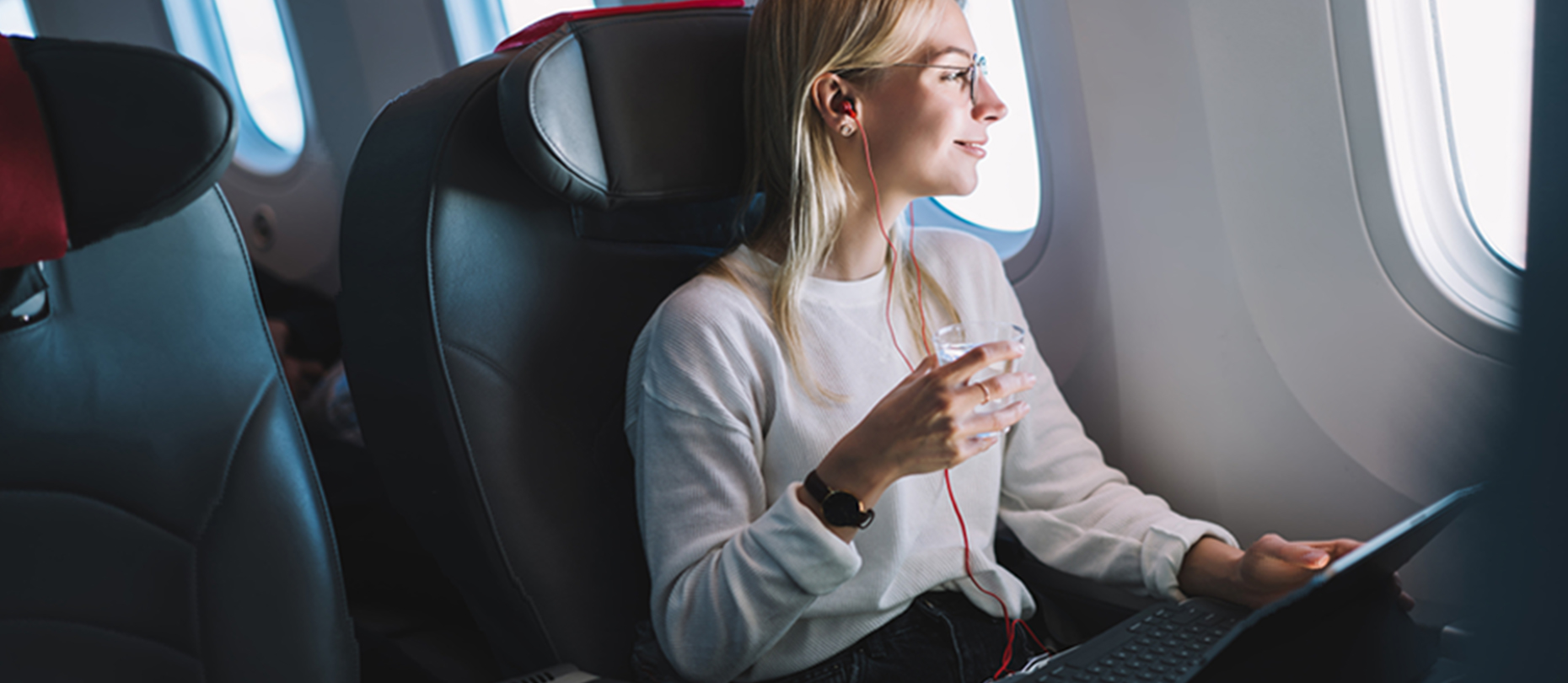HEALTHY LIVING
Healthy Travel Tips: Staying Hydrated While Traveling
Healthy Travel Tips: Staying Hydrated While Traveling
- Sub Heading
-
Flying sky-high can leave you feeling depleted from low humidity levels on the plane — but it doesn't have to.
- Duration
-
JUNE 26, 2023 2 MINUTE READ - Description
-
When you're getting ready for a trip, staying hydrated while traveling might not be on your radar — but it should be. Air travel can be surprisingly dehydrating, setting you up for possible effects of mild dehydration, such as headaches, dizziness and fatigue, before you even arrive at your destination. Not getting enough fluids can interfere with short-term memory, attention and mood, too.
If you're wondering how to stay hydrated while traveling so you can start your trip on the right foot, these healthy travel tips can help.
How Air Travel Affects Hydration
Generally speaking, the ideal humidity level for human health and comfort falls between 30% and 60%. However, humidity levels in most planes hover between 10% and 20% at cruising altitudes. Combined with low oxygen pressure, this can cause water to evaporate from your skin and lungs as you exhale. Avoiding fluids to reduce trips to the bathroom or forgetting to drink water can further exacerbate dehydration from fluid loss.
Signs of Dehydration During Air Travel
In-flight dehydration can sneak up on you. While thirst may be one of the first signs, many people don't feel thirsty until they're already dehydrated.
These common signs of dehydration can clue you in:
- Dry eyes, mouth and skin
- Dark urine
- Decreased urine output
- Headache
- Chapped lips
- Dry nasal passages
- Fatigue
- Dizziness
How to Stay Hydrated While Traveling
The trick to staying hydrated while traveling is planning in advance. Follow these healthy travel tips to keep dehydration at bay:
1. Toss a refillable water bottle into your carry-on bag. Don't be shy about asking the flight attendant to refill it once you've finished.
2. Bring along a few Pedialyte® Powder Packs, which have electrolytes and can keep you hydrated longer than water.
3. Take advantage of in-flight beverage services. Flavored seltzer, herbal tea and milk are all excellent alternatives to plain water if you’re looking to mix things up.
4. Avoid alcohol, which increases urine production and leads to additional fluid loss.
5. Satisfy the urge to snack with hydrating foods such as sliced fruit, precut veggies or a container of yogurt.
Remember to pack lip balm, saline nasal spray and travel-size hand cream, too. If you usually wear contacts, opt for a pair of glasses on the plane to avoid dry eyes.
There's no hard and fast rule about how much fluid you need while flying, but the Aerospace Medical Association recommends drinking roughly 8 ounces of water per hour in flight. If you plan to nap or get lost in a movie, setting an alarm on your watch or cellphone can be a helpful reminder.
Coats, Hats and...Hydration? How to Stay Hydrated in Cold Climates
- Description
-
Summer is the season that usually gets people thinking about how to stay hydrated. Hot weather makes you sweat, which increases the need for fluids, and you may feel thirstier in general. But what about winter?
Hydration in cold weather can be easy to overlook, but the truth is that cold temperatures can also increase the body's demand for fluids. In this article, you'll learn about how cold weather can increase your potential for dehydration, the signs and symptoms of dehydration and tips for staying hydrated all year long.
- Reference Page Path
- /content/an/newsroom/us/en/healthy-living/diet-wellness/Coats-Hats-and-Hydration-How-to-Stay-Hydrated-in-Cold-Climates.html
Healthy Foods to Eat Every Day: 365 Days of Nutrition
- Main Image
-

- Heading
-
Healthy Foods to Eat Every Day: 365 Days of Nutrition
- Description
-
Key Takeaways
• It's important to eat a well-rounded diet that consists of a variety of nutrient-dense foods.
• Small, incremental changes can make a big difference to your health over time.
• Turning your short-term goals into a long-term lifestyle takes time. - Reference Page Path
- /content/an/newsroom/us/en/healthy-living/diet-wellness/healthy-foods-to-eat-every-day--365-days-of-nutrition.html



Social Share